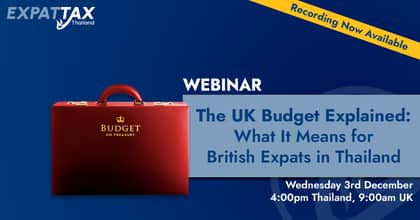เมื่อวันที่ 29 กรกฎาคม 2568 กรมสรรพากรได้ลงนามบันทึกข้อตกลงอย่างเป็นทางการกับสำนักงานพัฒนาวิทยาศาสตร์และเทคโนโลยีแห่งชาติ (สวทช.) และธนาคารกรุงไทย เพื่อร่วมกันพัฒนาระบบปัญญาประดิษฐ์ (AI) ที่จะมาปรับปรุงการบริหารจัดการภาษีของประเทศให้ทันสมัย
คุณสามารถเข้าถึงข่าวประชาสัมพันธ์ฉบับดั้งเดิมเป็นภาษาไทยได้ ผ่านทางเว็บไซต์ของกรมสรรพากร. เอกสารนี้ตีพิมพ์เป็นภาษาไทยเท่านั้น แต่ คุณสามารถดาวน์โหลดคำแปลของเราได้ที่นี่
ความร่วมมือนี้ถือเป็นก้าวสำคัญในความพยายามของรัฐบาลในการพัฒนาการให้บริการด้านภาษี เพิ่มประสิทธิภาพ และเสริมสร้างการปฏิบัติตามกฎระเบียบ ซึ่งรวมถึงการพัฒนาแชทบอท AI ภาษาไทยเพื่อช่วยเหลือผู้เสียภาษี รวมถึงระบบที่สามารถวิเคราะห์ข้อมูลทางการเงินปริมาณมากแบบเรียลไทม์ ระบบเหล่านี้จะถูกปรับแต่งให้เหมาะสมกับประเทศไทยโดยเฉพาะ โดยข้อมูลทั้งหมดจะถูกจัดเก็บและประมวลผลภายในประเทศ
สำหรับชาวต่างชาติ ผลกระทบที่สำคัญที่สุดคือความสามารถของกรมสรรพากรในการติดตามรายได้ เงินโอน และรูปแบบการพำนักอาศัยข้ามพรมแดนโดยใช้ AI ที่ดีขึ้น แม้ว่าการพัฒนาเหล่านี้มีเป้าหมายเพื่อให้บริการที่เข้าถึงได้ง่ายและเป็นส่วนตัวมากขึ้น แต่ก็ก่อให้เกิดความคาดหวังใหม่ๆ เกี่ยวกับการรายงานภาษีที่ถูกต้องและตรงเวลา
ข้อตกลงภาษี AI ฉบับใหม่ของไทย: รายละเอียดสำคัญ
ข้อตกลงดังกล่าวระบุถึงความร่วมมือสามทางระหว่าง:
- กรมสรรพากรซึ่งจะกำหนดกรณีการใช้งานภาษีและนำไปสู่การดำเนินการ
- สวทช. (ผ่านเนคเทค)รับผิดชอบพัฒนาระบบ AI ให้เหมาะสมกับภาษาไทยและสภาพแวดล้อมการกำกับดูแล
- ธนาคารกรุงไทยซึ่งจะจัดให้มีโครงสร้างพื้นฐานบนคลาวด์และรองรับการประมวลผลข้อมูลที่ปลอดภัย
ส่วนประกอบหลักของโครงการ ได้แก่:
- RD Voice Chatbot – ผู้ช่วยที่ขับเคลื่อนด้วย AI ที่จะตอบคำถามเกี่ยวกับภาษีเป็นภาษาไทย
- ระบุตำแหน่ง AI – เทคโนโลยีปัญญาประดิษฐ์ที่พัฒนาขึ้นเฉพาะสำหรับบริบททางกฎหมาย วัฒนธรรม และภาษาของประเทศไทย
- โครงสร้างพื้นฐานที่ปลอดภัย – โฮสต์บนระบบคลาวด์ภายในประเทศ สอดคล้องกับข้อกำหนดการกำกับดูแลข้อมูลระดับชาติ
การดำเนินการจะเกิดขึ้นเป็นระยะๆ ตั้งแต่ปี 2568 ถึงปี 2570 โดยเริ่มจากการปรับปรุงการประมวลผลข้อมูลภาษีไปจนถึงการบูรณาการเต็มรูปแบบกับบริการภาครัฐ
กรมสรรพากรไทยจะใช้เทคโนโลยี AI อย่างไร
เทคโนโลยีใหม่นี้จะช่วยให้กรมสรรพากรสามารถ:
- วิเคราะห์รูปแบบในการประกาศรายได้ การชำระภาษี และพฤติกรรมการโอนเงิน
- ระบุความผิดปกติหรือความไม่สอดคล้องที่อาจเกิดขึ้นเพื่อตรวจสอบเพิ่มเติม
- จัดทำบริการดิจิทัลและการแจ้งเตือนที่เหมาะสมตามโปรไฟล์และประวัติการยื่นภาษีของผู้เสียภาษีแต่ละราย
- รองรับการตรวจสอบภาษีที่รวดเร็วและแม่นยำยิ่งขึ้นโดยใช้การวิเคราะห์ตามความเสี่ยง
- เพิ่มความโปร่งใสและการเข้าถึงบริการผ่านเครื่องมือดิจิทัล
- ปรับใช้ RD Voice Chatbot เพื่อส่งมอบข้อมูลภาษีแบบเรียลไทม์ที่ขับเคลื่อนด้วย AI ในภาษาไทย
แนวทางนี้ออกแบบมาเพื่อเพิ่มประสิทธิภาพและความเป็นธรรมของระบบภาษี แทนที่จะพึ่งพาการตรวจสอบด้วยตนเองหรือการตรวจสอบแบบสุ่มเพียงอย่างเดียว กรมสรรพากรจะสามารถนำแบบจำลองที่อิงตามความเสี่ยงและการตรวจสอบข้อมูลแบบเรียลไทม์มาใช้เพื่อปรับปรุงคุณภาพการบริหารภาษีโดยรวม
ระบบภาษี AI ใหม่ของประเทศไทยมีความหมายต่อชาวต่างชาติอย่างไร
ผู้ที่อาศัยอยู่ในต่างแดนที่มีรายได้ สินทรัพย์ หรือเงินโอนจากต่างประเทศเข้ามาในประเทศไทยควรตระหนักว่าระบบใหม่นี้อาจส่งผลต่อสถานะทางภาษีของตนได้อย่างไร
1. การมองเห็นการโอนย้ายจากต่างประเทศที่มากขึ้น
ประเทศไทยจัดเก็บภาษีรายได้ที่มาจากต่างประเทศเมื่อมีการนำเงินดังกล่าวเข้าประเทศ คาดว่าเครื่องมือ AI ใหม่นี้จะช่วยเพิ่มประสิทธิภาพของกรมสรรพากรในการตรวจจับการโอนเงินเข้าประเทศ และพิจารณาว่าเงินโอนดังกล่าวเข้าข่ายเป็นรายได้ที่ต้องเสียภาษีหรือไม่
ซึ่งรวมถึงการโอนผ่าน:
- บัญชีธนาคารต่างประเทศ
- กระเป๋าเงินอิเล็กทรอนิกส์ เช่น PayPal หรือ Wise
- การแลกเปลี่ยนสกุลเงินดิจิทัลหรือแพลตฟอร์มสินทรัพย์ดิจิทัล
ผู้ที่อาศัยอยู่ต่างแดนควรตรวจสอบให้แน่ใจว่าการโอนเงินนั้นมีเอกสารประกอบที่เหมาะสมและสอดคล้องกับการยื่นภาษี
2. การจัดตำแหน่งที่ใกล้ชิดยิ่งขึ้นระหว่างถิ่นที่อยู่และภาระผูกพันในการยื่นเอกสาร
ระบบ AI ใหม่นี้จะช่วยให้กรมสรรพากรวิเคราะห์รูปแบบพฤติกรรมของผู้เสียภาษี รวมถึงระยะเวลาที่อยู่ในประเทศไทย บุคคลที่อยู่ในประเทศไทยตั้งแต่ 180 วันขึ้นไปในหนึ่งปีปฏิทิน ถือเป็นผู้มีถิ่นพำนักเพื่อเสียภาษีในประเทศไทย และอาจต้องเสียภาษีไทยจากรายได้จากต่างประเทศที่ส่งเข้ามาในประเทศไทย
การประเมินเหล่านี้อาจได้รับการสนับสนุนโดยการอ้างอิงไขว้บันทึกการย้ายถิ่นฐาน ข้อมูลการธนาคาร และประวัติการยื่นเอกสาร
ผู้ที่อาศัยอยู่ในต่างแดนควรบันทึกเวลาที่อยู่ในประเทศไทยอย่างถูกต้องและเข้าใจว่าตนจะมีสิทธิ์เป็นผู้มีถิ่นพำนักเพื่อเสียภาษีภายใต้กฎหมายไทยเมื่อใด
3. การตรวจจับข้อผิดพลาดหรือการละเว้นในการยื่นเอกสารได้รวดเร็วยิ่งขึ้น
การมีเครื่องมือวิเคราะห์ข้อมูลใหม่จะช่วยให้สามารถระบุความแตกต่างระหว่างรายได้ที่แจ้งกับการโอนจริงได้รวดเร็วยิ่งขึ้น
ซึ่งรวมถึง:
- รายได้จากต่างประเทศที่ขาดหายหรือรายงานไม่ถูกต้อง
- กำไรจากทุนที่ไม่ได้ประกาศจากการแปลงสกุลเงินดิจิทัลเป็นเงินบาท
- การปฏิบัติต่อเงินบำนาญ เงินปันผล หรือรายได้อิสระที่ไม่สอดคล้องกัน
แม้ว่าระบบจะมุ่งหวังที่จะเพิ่มความยุติธรรมในการให้บริการ แต่ยังหมายถึงข้อผิดพลาดอาจถูกแจ้งเตือนได้เร็วขึ้นและตอบสนองได้เชิงรุกมากขึ้นด้วย
ผู้ที่อาศัยอยู่ในประเทศไทยจะปฏิบัติตามระบบภาษีที่ขับเคลื่อนด้วย AI ได้อย่างไร
การจัดทำเอกสารที่แม่นยำและการรายงานเชิงรุกจะมีความสำคัญเพิ่มมากขึ้นภายใต้ระบบภาษีที่ขับเคลื่อนด้วย AI ใหม่ของประเทศไทย
ต่อไปนี้เป็นขั้นตอนปฏิบัติบางประการที่ควรพิจารณา:
- ติดตามและบันทึกการโอนเงินทั้งหมด – รวมถึงใบเสร็จรับเงิน, ข้อความ SWIFT และวัตถุประสงค์ของเงินทุน
- บันทึกรายละเอียดรายได้ – ไม่ว่าจะเป็นแหล่งจากต่างประเทศ ในประเทศ แบบพาสซีฟ หรือแบบแอคทีฟ
- บันทึกวันเวลาที่อยู่ในประเทศไทย – โดยเฉพาะอย่างยิ่งหากคุณมีวันใกล้ 180 วันในหนึ่งปี
- จัดเก็บบันทึกของคุณอย่างปลอดภัย – ควรจัดเก็บไว้ในโฟลเดอร์ดิจิทัลที่จัดเรียงตามปีภาษี
- ตรวจสอบการยื่นเอกสารของคุณ กับมืออาชีพเพื่อให้แน่ใจว่าข้อมูลเหล่านั้นสะท้อนถึงข้อมูลที่เกี่ยวข้องทั้งหมด
👉 ต้องการความช่วยเหลือในการยื่นภาษีไทยหรือไม่? สำรวจบริการการยื่นภาษีของเราสำหรับชาวต่างชาติที่อาศัยอยู่ในประเทศไทย
เหตุใดการสนับสนุนจากมืออาชีพจึงมีความสำคัญ
การปฏิบัติตามกฎหมายภาษีที่อิงกับการส่งเงินของประเทศไทยอาจมีความซับซ้อน โดยเฉพาะอย่างยิ่งเมื่อรายได้กระจายอยู่ในหลายประเทศ หลายสกุลเงิน และหลายแพลตฟอร์ม เมื่อกรมสรรพากรนำเทคโนโลยี AI มาใช้เพื่อเสริมสร้างการกำกับดูแล การทำงานร่วมกับที่ปรึกษาที่มีคุณสมบัติเหมาะสมจึงยิ่งมีความสำคัญมากขึ้น
ที่ Expat Tax Thailand เราช่วยเหลือลูกค้า:
- ตรวจสอบสถานะภาษีของคุณก่อนยื่นภาษีเพื่อลดความเสี่ยงในการตรวจสอบภายใต้การตรวจสอบของ AI
- ช่วยคุณเตรียมเอกสารการโอนเงินและให้แน่ใจว่าเอกสารนั้นสอดคล้องกับการยื่นภาษีของคุณ
- ให้คำแนะนำที่ชัดเจนเป็นภาษาอังกฤษและเป็นตัวแทนของคุณในกรณีที่กรมสรรพากรสอบถาม
เป้าหมายของเราคือการทำให้แน่ใจว่าคุณได้รับข้อมูลครบถ้วน ปฏิบัติตามอย่างครบถ้วน และได้รับการสนับสนุนอย่างเต็มที่
สบายใจก่อนยื่นฟ้อง
ระบบภาษีของไทยกำลังก้าวเข้าสู่ยุคใหม่ของการเปลี่ยนแปลงทางดิจิทัล แม้ว่าการเปลี่ยนแปลงเหล่านี้หลายอย่างจะมุ่งเป้าไปที่การปรับปรุงประสิทธิภาพและการเข้าถึงข้อมูล แต่การเปลี่ยนแปลงเหล่านี้ยังนำไปสู่การตรวจสอบที่ใกล้ชิดยิ่งขึ้น โดยเฉพาะอย่างยิ่งสำหรับชาวต่างชาติที่บริหารจัดการการเงินข้ามพรมแดน สิ่งสำคัญยิ่งกว่าที่เคยคือการตรวจสอบให้แน่ใจว่าการยื่นภาษีของคุณถูกต้อง ครบถ้วน และสอดคล้องกับกฎระเบียบปัจจุบัน
หากคุณมีคำถามหรือต้องการความช่วยเหลือในการยื่นเอกสาร โปรดจองการให้คำปรึกษาฟรีกับทีมงานของเราเพื่อรับคำแนะนำที่ชัดเจนและเป็นส่วนตัว


